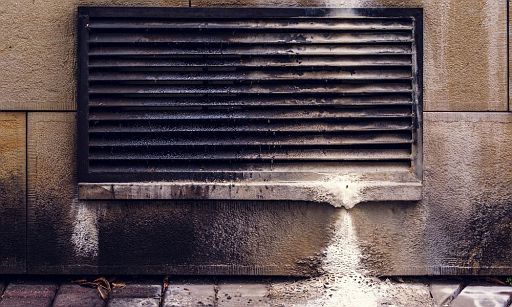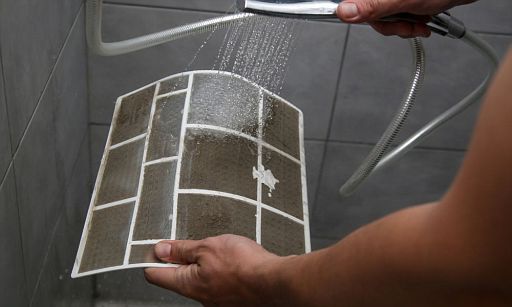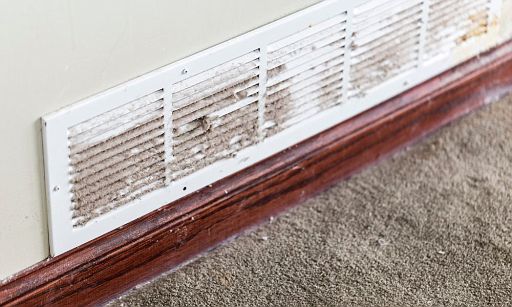Dirty Air Filter
Air filters are an essential component of any ventilation system, yet their importance is often overlooked. Studies have suggested that air filter cleanliness can significantly reduce the amount of airborne particles and improve the quality of indoor air. The theory follows that a dirty air filter will lead to poorer indoor air quality and increased levels of particulate matter in the home or office environment. This article investigates this hypothesis by examining both the scientific evidence regarding dirty air filters and practical methods for preventing and cleaning them.
The effects of poor air quality on human health have been widely studied over recent decades, with numerous studies linking exposure to harmful particulates to respiratory issues, allergies and other related conditions. Air filtration systems were designed as one solution to this issue; however it has become clear that these systems need regular maintenance if they are to remain effective at removing contaminants from the atmosphere.
This article aims to provide readers with greater insight into how a dirty air filter can affect indoor air quality and what steps should be taken to ensure its cleanliness. It examines existing research concerning the impact of airborne pollutants on human health, before exploring several strategies for keeping an air filter clean so as to maximize its effectiveness at reducing particle levels in the home or workplace environment.
1. What Is A Dirty Air Filter?
A dirty air filter is like a fog-filled window in an old house; it obscures the light and life that should exist. It's a representation of what happens when something essential gets neglected, often at great consequence. The technical definition of a ‘dirty air filter’ is one which has been clogged or blocked with dust and debris due to not being cleaned regularly or replaced as necessary.

The effects of having a dirty air filter are far reaching – from decreased efficiency of heating and cooling systems to negative impacts on overall indoor air quality, this issue can have serious repercussions for those who live within its walls. In terms of economics, running HVAC units with dirty filters leads to higher energy costs over time; if left unchecked, this could lead to more expensive repairs down the line too.
Understanding why these issues occur is key to preventing them from happening again in the future. So let us now explore some potential causes of dirtiness in air filters.
2. Causes Of A Dirty Air Filter
The cause of a dirty air filter can be attributed to several circumstances. Firstly, it is often the result of an increase in airborne pollutants within the environment that require more frequent replacement or cleaning of filters. Secondly, improper maintenance and care may lead to clogs and blockages due to buildup from dust and other particles. Lastly, age-related deterioration can occur over time as the filter material begins to lose its effectiveness.
In all cases, these causes create an environment where the filter becomes unable to capture airborne contaminants at their normal capacity or rate. The resulting effects are then felt through a decrease in efficiency with respect to heating and cooling systems, as well as indoor air quality issues such as poor air circulation, poor ventilation, elevated levels of allergens like pollen and pet dander, along with increased exposure to bacteria and viruses.
It is therefore important for homeowners and property owners alike to take proactive steps in order to identify when a filter has become compromised by one or more of the above factors so that they can address them accordingly before any major damage occurs both inside and outside of the home.
3. How To Identify A Dirty Air Filter
A dirty air filter can be likened to a ticking time bomb, as its presence often goes unnoticed until it’s too late. It is essential to identify the signs of a dirty air filter before serious damage can occur and preventative measures may need to be taken.
One way in which a dirty air filter can be identified is by smell; if an unpleasant odor permeates from an area with ventilation, this could indicate that the air filter needs replacing or cleaning. Furthermore, visual inspection can also provide clues; if dust particles are visible on the surface of the air filter when removed from its housing, then dirt has likely accumulated inside causing further blockages.
Finally, one should check for any noise coming from the system itself; rattling noises occurring at regular intervals may signal that something is wrong with the fan due to lack of airflow caused by a clogged-up air filter. If any of these scenarios present themselves, immediate steps toward rectifying this issue should be taken so as not to incur additional problems down the line.
4. Effects Of A Dirty Air Filter
A dirty air filter can have far-reaching implications for the health and well-being of both people and their property. To understand these effects, one must first identify what a dirty air filter is. Suspensefully, we now explore the repercussions of such an issue.
The primary concern when it comes to a dirty air filter is that it affects how efficiently it works in purifying the air within a home or other environment. When filters become clogged with dust, pollen and other debris they are unable to adequately remove pollutants from the circulating air. This means that occupants may be exposed to higher levels of allergens and irritants than necessary, leading to increased respiratory problems such as asthma attacks and allergies. Additionally, unclean filters can cause inefficient energy consumption, resulting in more costly utility bills each month due to reduced efficiency of HVAC systems.
Inspecting air filters regularly can help prevent build up and ensure effective functioning of heating and cooling units. In some cases however, if not maintained properly over time then removal and replacement may become necessary depending on the severity of contamination present in the system's components or ductwork . Making this determination requires expertise which should be sought if one suspects there may be an issue with their current filtration setup. With care taken to maintain cleanliness through regular inspections and replacements where needed, homeowners can protect themselves from potential risks associated with poor quality indoor air circulation caused by neglected filtration systems.

5. When To Replace A Dirty Air Filter
Replacing a dirty air filter is an important part of maintaining the health and efficiency of your vehicle. Knowing when to replace it can save you time, money and frustration in the long run.
Signs that your air filter needs replacing include visible dirt buildup on the surface or edges and a decrease in engine power during acceleration. Other indicators are black smoke coming from exhaust and increased fuel consumption due to obstruction of airflow caused by a clogged filter.
It's recommended to check for signs of wear every 12-15 months or after 10,000 miles driven. If possible, inspect your air filter at least once a year before winter sets in as cold weather can increase strain on your car’s engine system leading to diminished performance if the air filter has not been changed.
TIP: It may be helpful to set reminders about checking and changing your air filters as maintenance often gets neglected over time - don't let this happen! Regularly inspecting and cleaning (or replacing) your air filters helps preserve optimal engine performance while keeping pollutants out of the cabin environment.
6. Cost Of Replacing A Dirty Air Filter
The cost of replacing a dirty air filter depends on the type and size of the filter, as well as where it is purchased. For example, disposable filters will be less expensive than permanent ones. Permanent filters can range anywhere from $8 to over $100 depending on factors such as brand name, quality, and efficiency rating. If purchasing online or through an HVAC professional, there are often discounts offered for bulk orders or multi-pack purchases.
In addition to paying upfront costs associated with purchasing new filters, homeowners should also consider potential long-term savings that may result from replacement. Higher quality filters tend to have higher MERV ratings which help more effectively remove airborne particles from indoor spaces. This reduces strain on heating and cooling systems while providing cleaner air in homes.
Moreover, newer filters reduce need for maintenance since they do not get clogged up quickly like older models may do over time. This helps prevent dust buildup in ducts and vents which can cause major issues when left unchecked for extended periods of time. Replacing old filters with fresh ones can ultimately save money by avoiding costly repairs down the road due to blocked airflow or other system malfunctions caused by dirt accumulation.

7. Benefits Of Replacing A Dirty Air Filter
Replacing a dirty air filter has several benefits. Firstly, it can help improve the overall efficiency of an HVAC system; when a clogged or old air filter is replaced with a new one, the unit will be able to run more efficiently and effectively. Furthermore, replacing an air filter regularly helps reduce the likelihood of breakdowns due to overworked components within the HVAC system, as well as potentially reducing costly repairs in the future. Additionally, using clean filters can also limit dust accumulation on interior surfaces and furniture, since they prevent airborne particles from circulating throughout the home.
Another benefit of replacing a dirty air filter is that doing so may help decrease energy consumption costs. An unclean filter creates excessive strain on the motor which leads to higher electricity bills. Therefore, by changing out an air filter routinely it could mean lower utility expenses for homeowners. Moreover, if someone lives in areas where allergens like pollen and pet dander are common, having fresh filters installed would increase indoor air quality by trapping these irritants before they enter into living spaces.
Finally, some manufacturers offer warranties for their products that specify regular maintenance such as changing out an air filter every three months or else voiding coverage for any damage caused by lack of upkeep. So not only does this provide assurance against expensive repair costs but it also ensures proper functioning of equipment over time – making replacement of dirty air filters even more important.
8. Disadvantages Of Not Replacing A Dirty Air Filter
A dirty air filter can have a significant impact on the quality of air in any room. According to research, 82% of air filters should be replaced every 90 days for optimal performance[1]. Not replacing a dirty air filter regularly can lead to several disadvantages.
Firstly, it can cause an increase in energy consumption levels due to excessive strain on the HVAC system caused by clogged and dirty filters. This will result in higher bills as more electricity is required for cooling or heating when the airflow is restricted due to blockages from dirt particles.
Secondly, not changing out a dirty air filter may cause damage to other components within the HVAC system such as motors and coils that are prone to wear and tear if they are unable to receive adequate amounts of cool/warm air because of blocked channels. These damages could then require costly repairs which would further add onto overall financial expenditure over time.
Finally, neglecting a dirty air filter can also affect indoor health with potential consequences including allergies and respiratory problems associated with poor quality polluted airborne particles entering into living spaces. To ensure proper protection against these issues, regular inspection and maintenance of the entire HVAC unit (including its filters) should be monitored closely.
Properly maintaining clean air filters plays an important role in ensuring healthy environments both indoors and outdoors, leading to improved comfort levels at home while keeping costs down too.

9. Diy Cleaning A Dirty Air Filter
DIY cleaning a dirty air filter is not an easy task. It requires dedication, precision and time to get the job done right. Even with the best intentions, many people fail to properly clean their own filters due to lack of knowledge or experience in this area. To make sure that your air filter is properly cleaned, it's essential to understand how DIY cleaning works and what are its advantages and disadvantages over professional maintenance services.
The process of DIY cleaning starts with removing the existing filter from the system using safety precautions such as wearing gloves and eye protection when necessary. After the filter has been removed, it must be thoroughly inspected for any signs of damage or wear before attempting to clean it. Depending on the type of filter used, different methods may be required to effectively remove dirt and debris from the surface without damaging it further. One common method involves vacuum-cleaning the filter but other more specialized techniques could also be applied depending on the situation.
Once all contaminants have been eliminated from the filter, it should then be dried off completely before being reinstalled into its housing unit. This is important because any moisture left behind can lead to mold growth which could result in poor indoor air quality if not addressed appropriately. Additionally, regular replacement cycles should also be taken into consideration when engaging in DIY cleaning as some filters require frequent replacement due to their fragility or limited lifespan even with careful maintenance procedures in place.
By taking these steps into account, individuals can feel confident about successfully completing a DIY air filter cleaning procedure safely and efficiently. However, there are certain scenarios wherein seeking out expert help may still be beneficial despite having basic knowledge about how to do it yourself since professionals will typically use specialized tools and materials that allow them achieve better results than what most amateurs can accomplish on their own.
10. Professional Cleaning A Dirty Air Filter
The importance of clean air filters is no secret, with the adage 'cleanliness is next to godliness' being highly applicable. Thus, it stands to reason that a dirty air filter should be cleaned regularly and thoroughly in order to ensure optimal performance and safety. Professional cleaning of a dirty air filter can provide further benefits beyond what DIY methods may offer.
Firstly, professional cleaners know exactly how to safely handle, inspect and clean an air filter without damaging its components or accuracy. This means they will take fewer risks and have more control over the process than someone who might not understand all aspects of the operation. Additionally, professionals often have access to specialized tools and equipment which can make the job faster and easier, meaning less time spent on the task overall.
Finally, expert technicians are well-equipped for dealing with any unexpected issues that may arise during cleaning; such as blockages in vents or other parts which require attention from trained personnel before continuing work on the system. Moreover, professionals are also able to properly evaluate whether repairs or replacement parts are necessary due to underlying damage caused by dirt accumulation within the unit itself. All these factors combine to create a better outcome for those seeking thorough cleaning services for their home's filtration systems.
Conclusion
The effects of a dirty air filter are detrimental, both to the system and its users. It is important to be aware of how often an air filter should be replaced in order to protect against any health risks it may pose. A clean air filter will ensure that your home or office environment stays free from allergens and other pollutants.
By taking proactive measures such as regularly checking for dirt or debris buildup, one can identify when replacement is necessary. Furthermore, understanding whether it is better to clean or replace the dirty air filter allows for optimal performance of the system itself. Ultimately, “An ounce of prevention is worth a pound of cure” – regular maintenance on filters can help prevent larger issues down the road.
In conclusion, while there are many signs that indicate when a dirty air filter needs to be replaced or cleaned, being informed about how often they need replacing ensures that these systems run safely and efficiently throughout their lifespan. Taking care with air filters not only helps maintain energy efficiency but also provides protection from any potential health threats associated with poor indoor air quality.